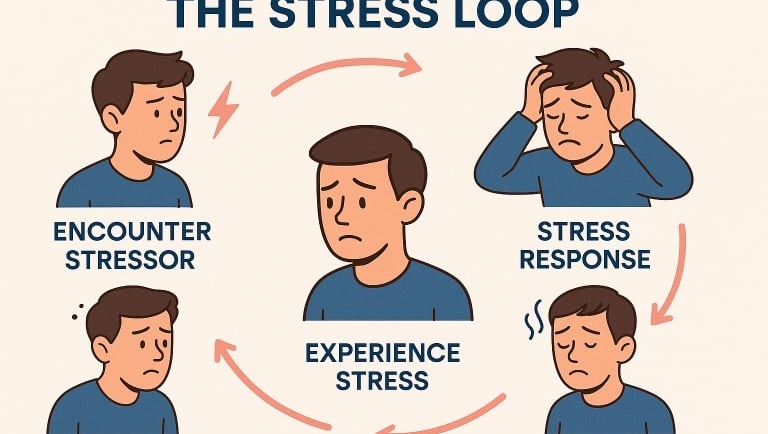How to Stay Strong During Stressful Situations
Discover simple, real-world ways to stay strong under stress. Breathwork, mindset shifts, and powerful tools to help you reset—no perfection required.
STRESS RELIEFANXIETYCHANGE WORKGENERAL
Marc Cooper
5/19/20254 min read


How can I stay strong during stressful situations?
Let’s not sugarcoat it—stress sucks. It sneaks up when you least expect it, like a seagull at the beach stealing your chips. One moment you’re coasting through your day, and the next you’re caught in a mental cyclone wondering if you’ve somehow forgotten how to breathe.
I get it. I’ve been there. There was a stretch of time when every single thing felt like it required effort—breathing, thinking, functioning. It was like waking up already behind, with the weight of everything sitting on your chest before your feet even hit the floor. And the worst part? People love to tell you to "just stay strong." Like strength is something you can pluck off a supermarket shelf between oat milk and overpriced kombucha.
So, how do you actually stay strong when the pressure’s mounting and everything feels like it’s one thread-pull away from unraveling? Let’s talk.
First of all, can we stop pretending that strength always looks like a stoic face and a stiff upper lip? That’s not strength. That’s suppression. Real strength is crying in your car, then walking into the meeting anyway. It’s taking a breath before you snap at someone. It’s saying, "I need a moment," instead of pretending you're fine when you’re absolutely not.
Stress is your brain’s way of sounding the alarm. It’s the mental version of a fire drill—sudden, loud, disruptive. But unlike a fire drill, you don’t always know what triggered it. Maybe it’s the work deadline. Maybe it’s that weird tone in your friend’s text message. Maybe it’s just Tuesday.
Here’s where your breath becomes your best friend. Not the shallow, chesty kind that comes with panic—but the low, slow, belly-filling kind. Seriously, try it right now. In through your nose, hold it for a beat, and out through your mouth. Again. Feel that? That’s you reminding your nervous system that you’re not being chased by a saber-toothed tiger. That you’re safe.
Your breath is the one tool that’s always with you. Doesn’t need charging. Doesn’t cost a cent. And when used with intention, it can shift your entire internal state. That’s not woo-woo. That’s neuroscience.
Sometimes, staying strong is about asking better questions. Not, “Why is this happening to me?” but, “What do I need right now?” Maybe the answer is a nap. Maybe it’s music. Maybe it’s stepping outside and letting the sun hit your face for three whole minutes.
You know that feeling when you’ve been stuck indoors all day, and then you finally step out and everything smells like fresh laundry and car exhaust? That’s your brain saying thank you. Because stress hates motionless bodies and stagnant air. A little movement—even just a walk to the mailbox—can interrupt the stress loop.
Let me tell you about a time that hit harder than it should’ve. It wasn’t some dramatic catastrophe—it was a morning I woke up and couldn’t bring myself to open my laptop. Emails piling up, clients waiting, to-do list stretching into absurdity... and I just sat there, staring. Frozen. That quiet kind of overwhelmed where nothing crashes, but everything slowly caves in. That moment wasn’t about work. It was about accumulated pressure with no release valve. That was the sign I needed to stop pushing and start listening.
Staying strong isn’t about dodging those moments. It’s about catching them sooner. It’s recognizing when you’re approaching your edge and choosing not to pretend it’s fine. Strength is awareness. Strength is honesty. Strength is saying, "Hey, I’m not okay right now, and that’s okay."
You’re not a robot. You’re not supposed to operate at 100% all the time. Even your phone needs a recharge (and a software update you’ve ignored for weeks). Why should you be any different?
And if you’re in a high-pressure situation that’s not letting up, try chunking it down. Break it into smaller, chewable bits. Don’t think about finishing the whole report—just write the first sentence. Don’t plan out the next five years—just focus on showing up today. One thing. One breath. One choice at a time.
Have you ever noticed how strong people don’t usually feel strong in the moment? It’s usually in hindsight that you realize, “Wow, I really held it together back there.” Strength is often quiet. Subtle. It doesn’t always make a scene. It’s not always inspirational. Sometimes it’s stubborn. Sometimes it’s messy.
One trick I use personally? I zoom out, mentally. I imagine myself in five years, looking back on this moment. Will it still matter? Will I even remember it? And if I will, what would I want to say to my past self? Most of the time, the message is simple: You did better than you think.
Stress lies to you. It tells you you’re failing. That you’re behind. That you’re alone. But it’s a distortion, not a fact. The truth is, you’re doing your best with what you’ve got—and that’s a kind of strength most people overlook.
And hey, if all else fails, you can always give your brain a little reset. That’s where I come in. My Mental Detox session is designed to help people like you reclaim their calm when everything feels like too much. It’s not therapy. It’s not self-help. It’s a deep, guided reset that pulls the plug on mental noise and lets you breathe again. You can check it out here.
So next time you find yourself on the verge—palms sweaty, heart racing, thoughts spiraling—remember this: You don’t have to bulldoze through it. You don’t have to perform resilience. You just have to keep showing up.
Stay soft. Stay honest. Stay human.
That, my friend, is real strength.
Address
Based in Los Angeles, CA
Online sessions available worldwide


